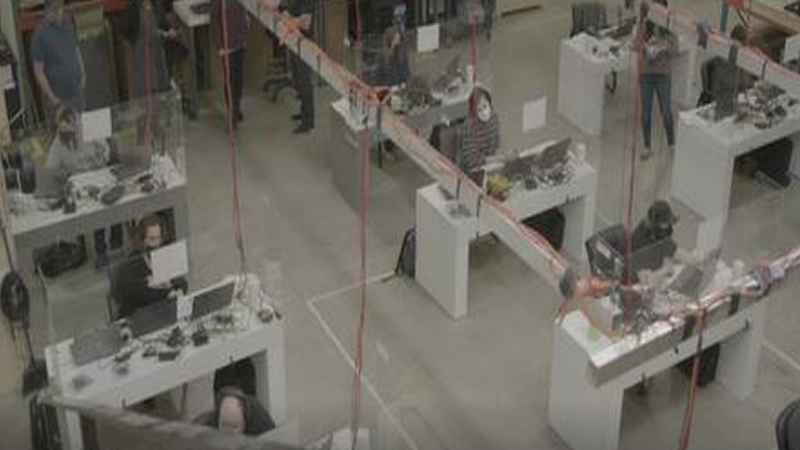Bloomington company does a pandemic pivot by going virtual in order to survive
[anvplayer video=”5009954″ station=”998122″]
Not long ago, metroConnections, a Bloomington-based conference and event services firm, was riding a wave.
Business was booming with clients all over the country.
"We were engaged in things like the Ryder Cup, the super bowl, working with clients there," recalls David Graves, the company’s president and CEO. "Most of the events we did would be anywhere from hundreds to thousands of people."
Then, the pandemic hit.
No more conventions.

[metroConnections]
No more large-scale meetings with thousands of people mingling in close proximity.
"We really lost all our business overnight," Graves says. "And we had to respond quickly."
"I never in my wildest dreams would have imagined the world that we were forced into," adds Haley Foulkes, metroConnections’s director of production services. "To figure out a solution to keep things going, to keep people connected with each other in the industry our company’s been in for decades."
Not only that, but just before the pandemic hit, metroConnections pivoted to become an employee-owned company.
The seventy-seven people working there, who handled 3000 events a year, decided they would go all-in on virtual.
"The good thing is we had the right people in place, we had the right technology in place to do that, so we were pretty quick to do it," Graves notes.
The company has its own studios, including a room that’s kind of like a zoom mission control.
But perhaps more importantly, there’s an eight-person creative services team called metroConnections 360.
The group designs and builds its own virtual web portals, each custom-made for their clients from scratch.
"A lot of the technology we’ve used in the live world, we were able to translate and manipulate to make it work in this virtual world for us," Foulkes explains.
In a matter of days, they transformed an in-person meeting or convention experience into a virtual exhibit hall visit.
"The product our team has developed is really immersive," Foulkes says. "So it’s kind of like walking through a video game almost."
The portal allows you to wander through that virtual world.
"So we start by building that environment out digitally," Graves says. "We enhance that with movement. So you come into a space, you are able to look around, be able to move forward, glance at things."
You can click through different booths, even have one-on-one meetings.
"You can go up to click to chat with booth representatives that are available to hop into a zoom meeting with you immediately," Foulkes adds. "Some instances, we have videos that play on-demand, where you can watch about different products and services."
For metroConnections, the pandemic was costly.
In a normal year, the company would earn $25-million.
In the midst of the coronavirus outbreak, that number fell to $10-million.
On the plus side, the company has already booked 1000 events so far this year.
One of them, an all-virtual annual meeting of ‘Meet Minneapolis’— the city’s convention and visitors bureau.
"We had close to 300 in our virtual meeting today," said Melvin Tennant, the president and CEO. "As an organization that promotes live events, we know that it’s important for us to get to the point where we can get back together in person, but the virtual meetings have certainly allowed us to stay in touch."
metroConnections says it has strict COVID-protocols for the people working in-person at the Bloomington headquarters.
"We do require temperature checks at the door, masks have been required since April and May, when we started to go back into the studio again," Foulkes says. "We have very strict occupancy rates in our studios. We want to make sure our employees feel safe coming to work. We want to make sure to avoid any major spread."
Foulkes has some real-world advice for clients navigating this brave new virtual world.
"Zoom fatigue is very real," she smiles. "Less is more. So if you would have normally done a five-day conference in the live world for eight hours a day, with social hours in the evening, cut that at least in half, if not by more."
Graves and his colleagues are preparing for the post-pandemic world too, by transitioning slowly into live events, but keeping a hybrid model.
"We’re going slow," he says. "Live presenters in a space with maybe a smaller audience."
The company says it’s starting to book hybrid events for late spring, summer and fall of this year.
The locations include Las Vegas, Orlando, and in Minneapolis, at the convention center and in some hotels.
Instead of 1500 people at an event, they might have 200 to 300 on-site, and the remaining attendees will dial in virtually.
"Most likely having a virtual component, even during a live meeting for maybe audience members that aren’t comfortable traveling yet, or attending, they’ll still have the option to view online, at least for the short term," Graves says.
The look and feel will be different, Foulkes agrees.
"Where it’s really hard is a lot of us get energy off of being in a big room with people, and we really don’t have that opportunity now," she says. "That pivot to virtual was a really big challenge. Kind of like being a start-up company, not something I thought I would be a part of."
Each event— one step at a time, Graves says.
"Eventually trying to get back to that fully live model. We’re pretty sure that virtual is here to stay," he says. "We’re geared up for that. That’s our big revolution, moving into the hybrid space."